Nice to get away from politics .. we’re on the road, November 19-26
Nov 18th, 2005 | By Counterweights Editors | Category: Key Current Issues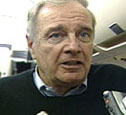 On his way to the Asia-Pacific economic summit in South Korea this week, Canadian prime minister Paul Martin “expressed relief at being out of the country.” And he told the reporters on the plane with him: “I think it is nice to get away from politics. I think there just has been too much tactics and strategy and rhetoric in Ottawa.”
On his way to the Asia-Pacific economic summit in South Korea this week, Canadian prime minister Paul Martin “expressed relief at being out of the country.” And he told the reporters on the plane with him: “I think it is nice to get away from politics. I think there just has been too much tactics and strategy and rhetoric in Ottawa.”
The counterweights editors understand this sentiment. And they will be out of the country themselves over the coming eight days, November 1926. The next posting will be on Monday, November 28 (when, on the current scenario, Martin’s minority government in Ottawa will fall at last).
Meanwhile, there has been more of “too much tactics and strategy and rhetoric in Ottawa.” Conrad Black has now been indicted by a US court in Chicago. Cindy Sheehan has been fined $75 for “protesting without a permit near the White House.”
Michaelle Jean is welcoming Shania Twain into the Order of Canada. And the CIA, in its war on terrorism, is operating a “multinational center in Paris,” which “includes representatives from Britain, France, Germany, Canada and Australia.”
More of “too much tactics and strategy and rhetoric in Ottawa”
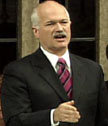 According to a late Thursday, November 17 report in the Globe and Mail: “The electoral gamesmanship on Parliament Hill has taken yet another turn, with Conservative Deputy Leader Peter MacKay hinting his party could try to bring down the minority Liberals a week earlier than previously anticipated.”
According to a late Thursday, November 17 report in the Globe and Mail: “The electoral gamesmanship on Parliament Hill has taken yet another turn, with Conservative Deputy Leader Peter MacKay hinting his party could try to bring down the minority Liberals a week earlier than previously anticipated.”
It seems that Liberal House Leader Tony Valeri has been saying some sly things about calling “for votes next week on a series of motions to implement tax cuts and other measures arising from Finance Minister Ralph Goodale’s recent mini-budget,” which would “by tradition, be considered confidence matters.” And “Mr. MacKay said it’s not a sure thing the Tories would support them … Monte Solberg, the party finance critic, echoed that view.” On the other hand, NDP leader Jack “Layton’s office appeared taken aback Thursday when Mr. MacKay raised the possibility of moving to bring down the government sooner than anticipated … Peter MacKay should look at the agreement that was announced last Sunday between the three leaders of the opposition,’ said Karl Belanger, a spokesman for Layton.”
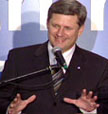 Mmm … Isn’t this just Tony Valeri trying to drive a wedge into the new united opposition, for the amusement of his fellow neo-Machiavellian Liberals if nothing else? And why do Conservatives like Peter MacKay and Monte Solberg seem so determined to present the appearance of falling for such tricks – prompting various voters to wonder again whether even the new Tories really are ready to try to govern Canada (especially as a minority government)? Surely the united opposition can think up enough procedural tricks of its own to avoid any too-early non-confidence votes next week, cunningly proposed by the Liberal House Leader?
Mmm … Isn’t this just Tony Valeri trying to drive a wedge into the new united opposition, for the amusement of his fellow neo-Machiavellian Liberals if nothing else? And why do Conservatives like Peter MacKay and Monte Solberg seem so determined to present the appearance of falling for such tricks – prompting various voters to wonder again whether even the new Tories really are ready to try to govern Canada (especially as a minority government)? Surely the united opposition can think up enough procedural tricks of its own to avoid any too-early non-confidence votes next week, cunningly proposed by the Liberal House Leader?
Meanwhile, Paul Martin may be happy to be away from all such petty politics in the capital city. But he is apparently not averse to playing his own brand of domestic politics on his travels for his country abroad. Early Friday morning the Globe and Mail posted another story headlined: “MARTIN REBUKES BUSH AT APEC OVER TRADE.” And a new Decima Research opinion poll “paints a picture of a conflicted electorate split between the desire to turf the federal Liberals from office and an equally compelling wish to avoid a Stephen Harper-led Conservative government.” So the next election should be interesting enough.
Conrad Black indicted in US at last …
 Some Canadians are almost certainly rudely pleased to hear that Conrad Black has now been “indicted in Chicago … on charges that he and three former colleagues stole $51.8 million from Hollinger International, the giant international newspaper publisher he helped create.”
Some Canadians are almost certainly rudely pleased to hear that Conrad Black has now been “indicted in Chicago … on charges that he and three former colleagues stole $51.8 million from Hollinger International, the giant international newspaper publisher he helped create.”
According to the New York Times: “An arrest warrant has been issued for Lord Black, and there were reports last night that he was believed to be in Canada. But [US attorney] Mr. Fitzgerald said he could not comment on his whereabouts, adding: He will end up needing to appear in front of a judge in Chicago. We think he should be extradited.'” (Jennifer Wells has now reported on Canadian TV, Friday night, that Mr. Black is said to be prepared to show up of his own accord in front of a judge in Chicago – where dates for possibly very lengthy further legal proceedings will be set.)
Mr. Black may have given up his Canadian citizenship to become Lord Black. But it seems that in his moment of deepest crisis it is Canadian lawyers who are rushing to his defense. As the New York Times has also reported: “Lord Black’s Toronto lawyer, Edward Greenspan, issued a statement saying, Conrad Black asserts his innocence without qualification.'” And a “lawyer for [one of three others indicted along with Mr. Black] Mr. Boultbee, Donald Jack, said his client would vigorously defend the charges against him and is confident of the outcome.'”
Cindy Sheehan will be appealing her $75 fine …
 According to CBS News: “Iraq War protester Cindy Sheehan and 26 other peace activists were found guilty Thursday of protesting without a permit near the White House. They were each ordered to pay $75 in fines and court costs, but Sheehan’s lawyer said he plans to appeal the verdict. We weren’t demonstrating,’ Sheehan told reporters after the trial.”
According to CBS News: “Iraq War protester Cindy Sheehan and 26 other peace activists were found guilty Thursday of protesting without a permit near the White House. They were each ordered to pay $75 in fines and court costs, but Sheehan’s lawyer said he plans to appeal the verdict. We weren’t demonstrating,’ Sheehan told reporters after the trial.”
Meanwhile on this front, a new USA TODAY/CNN/Gallup Poll in the great republic has reported that “more than half of those surveyed wanted to withdraw U.S. troops from Iraq within the next 12 months.” And: “Some political scientists and historians predict that the Iraq conflict, like the one in Vietnam, will shape American attitudes on foreign policy and the use of military force long after it’s over. This war is probably a really big deal historically in terms of America’s perspective on the world,’ says John Mueller, a political scientist at Ohio State University. What you’re going to get after this is ‘We don’t want to do that again? No more Iraqs’ just as after Vietnam the syndrome was ‘No more Vietnams.””
Shania Twain, OC (or whatever it is) …
 Conrad Black might have been better off if he’d settled for just becoming a member of the Order of Canada, instead of a proper Lord across the ocean in the UK. In any case “being recognized with Canada’s highest civilian honour – The Order of Canada” is something that singer and “Timmins, Ontario native” Shania Twain “takes … in stride.” Today, Friday, November 18, 2005, she is joining “43 other people – including speed skater Catriona Le May Doan and former British Columbia Premier David Barrett – receiving the nation’s top honour.” (The list also includes the remarkable mayor of Mississauga, Ontario, Hazel McCallion – still vigorous and politically active in her 80s, and a public inspiration for anyone over 50 in Canada or anywhere else today.)
Conrad Black might have been better off if he’d settled for just becoming a member of the Order of Canada, instead of a proper Lord across the ocean in the UK. In any case “being recognized with Canada’s highest civilian honour – The Order of Canada” is something that singer and “Timmins, Ontario native” Shania Twain “takes … in stride.” Today, Friday, November 18, 2005, she is joining “43 other people – including speed skater Catriona Le May Doan and former British Columbia Premier David Barrett – receiving the nation’s top honour.” (The list also includes the remarkable mayor of Mississauga, Ontario, Hazel McCallion – still vigorous and politically active in her 80s, and a public inspiration for anyone over 50 in Canada or anywhere else today.)
The honour will be presented by Governor General Michaelle Jean. And if the Globe and Mail editorial board has its way, those honoured will ultimately be among those who wind up choosing Mme Jean’s successors – once some reformed version of her office finally replaces the British monarchy across the ocean as Canada’s official as well as practical ceremonial head of state. But here’s hoping that this does not happen, and that Mme Jean’s successors are instead democratically chosen by the Canadian people, to whom the Canadian head of state should be accountable in the first place, in the new democratic age of the 21st century. (A practice now already followed, e.g., in the newly hip parliamentary democratic republic of Ireland.)
So Canada is part of the CIA’s Alliance Base in Paris … mmm … (oh, and btw, there’s a new deal on Internet governance in the global village too) …
 It has been an anomaly of at least the more recent history of democracy in America that such organizations as the CIA and the FBI often seem to take it upon themselves to act for we the peoples’ government in a way that does not seem to be accountable (or sometimes even known) to anyone or anything but the organizations themselves. (The FBI under the altogether strange regime of J. Edgar Hoover, who certainly saw himself as beyond even the supervision of the democratically elected president, is no doubt the classic case in point.)
It has been an anomaly of at least the more recent history of democracy in America that such organizations as the CIA and the FBI often seem to take it upon themselves to act for we the peoples’ government in a way that does not seem to be accountable (or sometimes even known) to anyone or anything but the organizations themselves. (The FBI under the altogether strange regime of J. Edgar Hoover, who certainly saw himself as beyond even the supervision of the democratically elected president, is no doubt the classic case in point.)
It is intriguing in this context that the Washington Post has just reported on how the”CIA has established joint operation centers in more than two dozen countries where U.S. and foreign intelligence officers work side by side to track and capture suspected terrorists … The secret Counterterrorist Intelligence Centers are financed mostly by the agency … The CIA has operated the joint intelligence centers in Europe, the Middle East and Asia, according to current and former intelligence officials. In addition, the multinational center in Paris, codenamed Alliance Base, includes representatives from Britain, France, Germany, Canada and Australia.” (So Canada is also involved in all this, and we the Canadian people, as small-is-beautiful as we are, should no doubt be paying some attention too.)
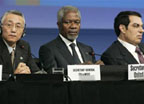 On a very last and somewhat less furtive note, all of us who spend such increasing amounts of time trolling the Internet for news of the global village nowadays should of course be especially interested to hear that: “A summit … opened Wednesday with an agreement of sorts on who will maintain ultimate oversight of the Internet and the flow of information, commerce and dissent … Negotiators from more than 100 countries agreed late Tuesday to leave the United States in charge of the Internet’s addressing system, averting a U.S.-EU showdown at this week’s U.N. technology summit.”
On a very last and somewhat less furtive note, all of us who spend such increasing amounts of time trolling the Internet for news of the global village nowadays should of course be especially interested to hear that: “A summit … opened Wednesday with an agreement of sorts on who will maintain ultimate oversight of the Internet and the flow of information, commerce and dissent … Negotiators from more than 100 countries agreed late Tuesday to leave the United States in charge of the Internet’s addressing system, averting a U.S.-EU showdown at this week’s U.N. technology summit.”
More than anything like the CIA or the War in Iraq or perhaps even the global financial centre in New York City and the almighty US dollar and GNP, this may be what is still making the United States such an interesting and influential place today, in the early 21 st century of a rapidly changing world at large?
Nov 16-17: SANTA CLAUS ELECTION IN CANADA .. how far can the new neo-Red Tories go?
 WEDNESDAY, NOVEMBER 16, 2005. 1:30 AM. [UPDATED THURSDAY, NOVEMBER 17. 9:30 PM]. This week has panned out as a kind of phony war period in the Fall 2005 defeat of the Government of Canada saga. The scenario now, as CBC News reported earlier, “is that the opposition parties would move a motion of non-confidence next week, but wait a further week before actually voting, thus allowing the [Aboriginal] First Ministers conference to go ahead” in Kelowna, BC.
WEDNESDAY, NOVEMBER 16, 2005. 1:30 AM. [UPDATED THURSDAY, NOVEMBER 17. 9:30 PM]. This week has panned out as a kind of phony war period in the Fall 2005 defeat of the Government of Canada saga. The scenario now, as CBC News reported earlier, “is that the opposition parties would move a motion of non-confidence next week, but wait a further week before actually voting, thus allowing the [Aboriginal] First Ministers conference to go ahead” in Kelowna, BC.
CTV News also reported earlier that “NDP Leader Jack Layton told reporters … he wants a formal vote by the House of Commons on his compromise proposal.” (I.e. Prime Minister Martin agrees to call an election for February 13, instead of late March or early April, as Mr. Martin originally promised.) On Thursday Mr. Layton introduced his proposal in the House. If the government doesn’t buy this (as is now virtually certain?) the opposition non-confidence vote will start to unfold next week, and an “election date of either Jan. 9 or 16 is being bandied about.” (And now Jan. 2 has been added to the list – along with Jan. 23, while other sources say Jan. 9 is the earliest possible date.)
Just after noon on Wednesday the press clarified that Conservative leader Stephen Harper “said he expects the debate on the confidence motion to be held Nov. 24, with the vote on Nov. 28 likely to trigger the fall of the government.” On Wednesday as well Prime Minister Martin, about to leave for a three-day Asia-Pacific economic summit in South Korea, said “that the question of election timing is in the oppositions’ hands’.”
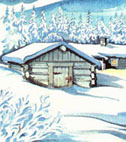 Mr. Martin went on: “The choice is theirs … I put out a date or a range of dates and the difference is, at best, eight weeks. And you got to ask yourself fundamentally, why – what is so important that you cannot wait for eight weeks?” But at least some voters may also wonder why, if eight weeks is not really that important, the Liberals can’t just be noblesse oblige good sports and gracefully accede to Jack Layton’s compromise proposal as endorsed by the three united opposition parties – which do now command a clear majority of seats in the democratically elected Parliament?
Mr. Martin went on: “The choice is theirs … I put out a date or a range of dates and the difference is, at best, eight weeks. And you got to ask yourself fundamentally, why – what is so important that you cannot wait for eight weeks?” But at least some voters may also wonder why, if eight weeks is not really that important, the Liberals can’t just be noblesse oblige good sports and gracefully accede to Jack Layton’s compromise proposal as endorsed by the three united opposition parties – which do now command a clear majority of seats in the democratically elected Parliament?
(And besides, as Gilles Paquet has now nicely reminded us on TV Ontario, on the original scheduling of the so-called second Gomery report, Paul Martin was at first going to call an election early in January for, say, February 19 -Â just six days after Jack Layton’s current and apparently quite doomed proposal before the House.)
Meanwhile, certain big thinkers beyond the Ottawa hothouse have started to wonder vaguely just how far the new united opposition alliance, especially between Stephen Harper’s Conservatives and Jack Layton’s New Democrats, can finally go. Could this actually be the beginnings of some fresh approach to a stable minority government that works, after the next federal election, whenever it exactly comes? Probably not, no doubt. But the thought provides some enlivening distraction while the phony war drones on.
The Spector Thesis on the Wet Coast …
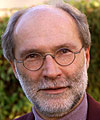 Former Brian Mulroney Progressive Conservative staffer (and Canadian ambassador to Israel), Norman Spector, who now lives in Victoria, BC, has probably gone the furthest, in public, with speculations about the longer-term potential of the new temporary alliance between Stephen Harper’s Conservatives and Jack Layton’s New Democrats.
Former Brian Mulroney Progressive Conservative staffer (and Canadian ambassador to Israel), Norman Spector, who now lives in Victoria, BC, has probably gone the furthest, in public, with speculations about the longer-term potential of the new temporary alliance between Stephen Harper’s Conservatives and Jack Layton’s New Democrats.
In a Monday, November 14 Globe and Mail column Mr. Spector praised Mr. Harper’s astuteness in “ceding the lead role in the drama” now unfolding in Ottawa “to NDP leader Jack Layton.” This “association with the NDP,” Spector went on, “could pay several additional dividends … by showing you can work with New Democrats, you neatly anticipate the argument – particularly salient in Ontario and among elites – that a Conservative government would be dependent on the Bloc Qubcois after the next election.”
 Norman Spector went on with some further provocative advice for Stephen Harper: “you should begin to set out areas where the Conservative Party would be able to work with the NDP in a minority Parliament. The most obvious area is ethics in government … The NDP’s integrity package hits many of the same points as your proposed accountability act. Produced under the stewardship of former NDP leader Ed Broadbent, it also includes several elements of electoral reform that are consistent with the Conservative Party’s latest policy declaration … You should give serious thought to proposing that Mr. Broadbent (who won’t be running in the next election) head a commission on electoral reform.”
Norman Spector went on with some further provocative advice for Stephen Harper: “you should begin to set out areas where the Conservative Party would be able to work with the NDP in a minority Parliament. The most obvious area is ethics in government … The NDP’s integrity package hits many of the same points as your proposed accountability act. Produced under the stewardship of former NDP leader Ed Broadbent, it also includes several elements of electoral reform that are consistent with the Conservative Party’s latest policy declaration … You should give serious thought to proposing that Mr. Broadbent (who won’t be running in the next election) head a commission on electoral reform.”
This is the kind of almost Red Tory thinking that made former Ontario NDP leader Stephen Lewis Canadian ambassador to the UN during the Mulroney years. And it is easy enough to dismiss it out of hand in the age of the new and presumably more right-wing ideological Canadian Conservative Party led by Stephen Harper, who makes his home in Calgary, Alberta. (As one Globe and Mail writer of Letters to the Editor said about Spector’s November 14 column: “Norman Spector lays out a road map for Stephen Harper to follow to victory in the looming shotgun election … Curious advice, indeed: Find common ground with the NDP. Huh?”)
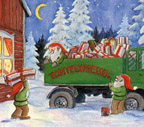 Yet some evidence from the latest Ipsos-Reid poll of Canadian federal voters, taken over November 810, lends at least a certain kind of weight to such speculations. As John Ibbitson has just observed: “a minority government of some description or another is virtually inevitable at the next election, and at the election after that (unless you have a magic potion that will make the Bloc Qubcois go away).” And, according to the Ipsos-Reid poll, as matters stand, only “slightly more Canadians say they would prefer a minority government led by Paul Martin and the Liberals (48%) than say they would prefer one led by Stephen Harper and the Conservatives (42%) … Over half of Bloc Quebecois supporters (56%) and 28% of NDP supporters would prefer a Conservative led minority over a Liberal one.”
Yet some evidence from the latest Ipsos-Reid poll of Canadian federal voters, taken over November 810, lends at least a certain kind of weight to such speculations. As John Ibbitson has just observed: “a minority government of some description or another is virtually inevitable at the next election, and at the election after that (unless you have a magic potion that will make the Bloc Qubcois go away).” And, according to the Ipsos-Reid poll, as matters stand, only “slightly more Canadians say they would prefer a minority government led by Paul Martin and the Liberals (48%) than say they would prefer one led by Stephen Harper and the Conservatives (42%) … Over half of Bloc Quebecois supporters (56%) and 28% of NDP supporters would prefer a Conservative led minority over a Liberal one.”
That only “28% of NDP supporters would prefer a Conservative led minority over a Liberal one” at the moment is of course one of the big problems in trying to give any extended shelf life to the current collaboration between the Layton New Democrats and Harper Conservatives. Another is of course that you would guess only an even smaller proportion of Harper’s current strongest Conservative supporters would be at all happy about a Conservative minority government that depended on support from the New Democrats to remain in office. (Link Byfield in Alberta, e.g., has lately been complaining that the only kind of conservative government the people of Ontario would be prepared to vote for en masse would not be worth having.)
 At the same time, there are those who at least used to say that Ontario is at its deepest depths a Red Tory province – which only votes Liberal federally because the Conservatives usually have no traction in the practically valued old sister province of Quebec. (Hello Jack and Harper’s fairweather friend Gilles Duceppe, well sort of, and, as Norman Spector says, not too importantly, with Jack’s NDP on board too?) And Warren Kinsella has just noted that the volatile suburban and exurban “905” hinterland of the Greater Toronto Area – which has proved itself open to assorted strange populist political experiments in the past – is starting to get restless in the polls again.
At the same time, there are those who at least used to say that Ontario is at its deepest depths a Red Tory province – which only votes Liberal federally because the Conservatives usually have no traction in the practically valued old sister province of Quebec. (Hello Jack and Harper’s fairweather friend Gilles Duceppe, well sort of, and, as Norman Spector says, not too importantly, with Jack’s NDP on board too?) And Warren Kinsella has just noted that the volatile suburban and exurban “905” hinterland of the Greater Toronto Area – which has proved itself open to assorted strange populist political experiments in the past – is starting to get restless in the polls again.
In any case, as Warren Kinsella has also just noted: “Once again, with feeling: why didn’t the Libs take Layton up on his earlier offer? They may now be wishing they did.” The main point for the moment, no doubt, is just who really knows? The fresh federal election which now seems almost certain to happen sometime sooner not later just might prove to be a bit more interesting than expected – even if it does encroach a little on the slippery terrain of Santa Claus?
Nov 15 – Blogging The Week That Is .. CANADIAN DOLLAR FALLS ON ELECTION CONCERN
 TUESDAY, NOVEMBER 15, 2005. 1:30 AM [UPDATED 1:15 PM]. There are as yet no reports on what Shania Twain thinks about an early federal election call in her home and native land. But she looks a lot better than Paul Martin, or any of the three opposition leaders in Canada’s present parliament.
TUESDAY, NOVEMBER 15, 2005. 1:30 AM [UPDATED 1:15 PM]. There are as yet no reports on what Shania Twain thinks about an early federal election call in her home and native land. But she looks a lot better than Paul Martin, or any of the three opposition leaders in Canada’s present parliament.
Meanwhile, events in Ottawa do not as yet seem to have clarified much for anyone else either. Around 2 PM on Monday, November 14 Prime Minister Paul Martin announced at a press conference that his Liberal minority government would not agree to call an election for mid February 2006 – as requested by the united opposition leaders, who now command a clear majority of seats in the elected House. Later in the afternoon Liberal finance minister Ralph Goodale presented a government financial update, promising some $39 billion worth of new spending initiatives and tax cuts along the way.
 Goodale’s financial update did look a lot like a pre-election mini-budget. And the current Ottawa insider wisdom appears to be that if Martin continues to reject the united opposition parties’ demand for a February 2006 election, they will likely introduce a formal motion of non-confidence in his minority government on November 24. This “would be voted on November 29, triggering the fall of the Liberals and setting the clock ticking toward a January 9 election” (or, some sources say, January 16). Like everything else in Canadian federal politics at the moment, the reliability of this scenario remains unclear.
Goodale’s financial update did look a lot like a pre-election mini-budget. And the current Ottawa insider wisdom appears to be that if Martin continues to reject the united opposition parties’ demand for a February 2006 election, they will likely introduce a formal motion of non-confidence in his minority government on November 24. This “would be voted on November 29, triggering the fall of the Liberals and setting the clock ticking toward a January 9 election” (or, some sources say, January 16). Like everything else in Canadian federal politics at the moment, the reliability of this scenario remains unclear.
Meanwhile again, if the financial markets really are the ultimate judges of almost everything in the global village nowadays, an early Canadian federal election of one sort or another is almost certainly blowing in the wind. On Monday, November 14 as well Bloomberg.com reported that the “Canadian dollar fell to the lowest since August against its U.S. counterpart as investors await the scheduling of a federal government election.”
Contrarian musings … might it actually have been smarter for Paul Martin to just buy into Jack Layton’s February election gambit?
 The logic behind the scenario for an opposition non-confidence motion introduced on November 24, with a vote that would finally bring the government down on November 29, seems clear enough. This would allow time for the late November AboriginalFirst Ministers conference in Kelowna, BC, which everyone seems to agree is some kind of high-minded objective. And, assuming something like a 36-day campaign, it would put the actual election date into January 2006, after the late December holiday season.
The logic behind the scenario for an opposition non-confidence motion introduced on November 24, with a vote that would finally bring the government down on November 29, seems clear enough. This would allow time for the late November AboriginalFirst Ministers conference in Kelowna, BC, which everyone seems to agree is some kind of high-minded objective. And, assuming something like a 36-day campaign, it would put the actual election date into January 2006, after the late December holiday season.
As at least some implications of the decisions that all the key players seem to be making start to become slightly less dim, this scenario also makes you wonder a bit about whether Paul Martin and the Liberals might not have been better off just gracefully accepting New Democrat leader Jack Layton’s scheme for a February 2006 election in the first place?
 The Liberals’ present strategy appears to be to let the newly united opposition parties defeat them now, and then place the blame for an early election that polls say the majority of voters still do not want squarely on the opposition parties. As an interim tactical manoeuver this no doubt makes sense. But as all the tedious spin-doctoring begins, you start to wonder whether it will still make sense if and when the opposition majority actually does defeat the minority government.
The Liberals’ present strategy appears to be to let the newly united opposition parties defeat them now, and then place the blame for an early election that polls say the majority of voters still do not want squarely on the opposition parties. As an interim tactical manoeuver this no doubt makes sense. But as all the tedious spin-doctoring begins, you start to wonder whether it will still make sense if and when the opposition majority actually does defeat the minority government.
As Paul Martin noted at his Monday, November 14 press conference, until the June 2004 election that produced the present parliament, Ottawa had not seen a minority government for 25 years. Yet if the voting people of Canada are still in the mood to elect another minority government (as almost all the polls for some time have suggested), the ultimate issue in an early 2006 election could conceivably become whether the Liberals are really the right people to run such a government successfully. Does their current “culture of entitlement” to govern Canada, e.g., finally render them not fit for the job that needs to be done, in the eyes of the people of Canada right now?
 As matters stand, no doubt, it does not seem that Stephen Harper’s Conservatives are the right people to run a federal minority government right now either. But this perception might start to shift somewhat, if and when all three opposition parties stay united, and actually do defeat the government at the end of November, and precipitate a fresh election in January. What leader will have shown that he can successfully put together a working parliamentary majority then?
As matters stand, no doubt, it does not seem that Stephen Harper’s Conservatives are the right people to run a federal minority government right now either. But this perception might start to shift somewhat, if and when all three opposition parties stay united, and actually do defeat the government at the end of November, and precipitate a fresh election in January. What leader will have shown that he can successfully put together a working parliamentary majority then?
Of course, it may also be that the Liberals’ apparent present strategy will finally prove to be cunningly clever once again – even if it is well-steeped in their current culture of entitlement to govern. In any case, on what seems to be an earlier and now probably outdated scenario, everything still might just come to a head later today, Tuesday, November 15 – or at least Thursday, November 17. But it also appears to have become clearer that the opposition parties would probably be altogether too rash and foolish to move quite so quickly. The rest of this week in parliament could finally be dominated by further cat and mouse games, with not much real governing of any sort getting done. (Which is arguably an increasingly good argument for a fresh election soon enough in its own right?)
Nov 14 – Blogging The Week That Is .. HAS THE GOVERNMENT OF CANADA FALLEN YET?
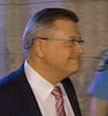 MONDAY, NOVEMBER 14, 2005. 12:30 AM. [LINKS UPDATED 1:30 PM]. The latest big thickening of the plot in Canadian federal politics has begun, and who knows just what will finally happen over the next two weeks?
MONDAY, NOVEMBER 14, 2005. 12:30 AM. [LINKS UPDATED 1:30 PM]. The latest big thickening of the plot in Canadian federal politics has begun, and who knows just what will finally happen over the next two weeks?
All three opposition party leaders met in Ottawa on Sunday, November 13. They agreed to request Liberal minority prime minister Paul Martin to call a fresh election early in January, for a date in mid-February. If the prime minister does not agree, Conservative leader Stephen Harper told reporters after the meeting, what appears to be the now-united-we-stand opposition parties – who command a clear 170-seat majority in a 308-seat House – will defeat the government “within the next two weeks,” and precipitate an election call much sooner (for what still appears to be a date in late December).
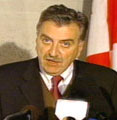 This news had barely reached the public when “Liberal House Leader Tony Valeri told reporters Sunday evening in Toronto the government would not agree to call an election in January … He said the government would maintain its original promise to call an election for the spring, 30 days after the second sponsorship report due back February 1” (for what still appears to be a date early in April).
This news had barely reached the public when “Liberal House Leader Tony Valeri told reporters Sunday evening in Toronto the government would not agree to call an election in January … He said the government would maintain its original promise to call an election for the spring, 30 days after the second sponsorship report due back February 1” (for what still appears to be a date early in April).
So what happens now? To start with, the besieged Liberal government’s finance minister, Ralph Goodale, will try to present his annual fiscal update in Parliament later today, Monday, November 14 – in a form rumored to have more in common with a pre-election mini-budget. All three opposition parties also seem to agree at the moment that this is not a good idea either. But it does suggest that an election campaign has already begun. And if this is true, you might ask, can an actual election be all that far away?
Fast times on Parliament Hill …
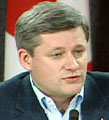 Whatever else, the next two weeks in Ottawa, or perhaps even less, should be interesting or even fascinating times for congenital Canadian political junkies. There are those who will say as well that they will not be good times for the people of Canada.
Whatever else, the next two weeks in Ottawa, or perhaps even less, should be interesting or even fascinating times for congenital Canadian political junkies. There are those who will say as well that they will not be good times for the people of Canada.
But by this point – at what is hopefully nearing the end of a long, strange journey which began this past spring – the situation does seem to have become so radically unpredictable that only the people of Canada will be able to judge just what the next two weeks in Ottawa will mean for them, a bit further down the road.
 The optimistic point of view would seem to be that, somewhere beneath all the raw and frequently absurd political gamesmanship (on all sides, and certainly including the Liberals), some real problems of governing the Canadian confederation of 1867 in the 21st century lie lurking. They have been put off a little too long, for various expiring good reasons.
The optimistic point of view would seem to be that, somewhere beneath all the raw and frequently absurd political gamesmanship (on all sides, and certainly including the Liberals), some real problems of governing the Canadian confederation of 1867 in the 21st century lie lurking. They have been put off a little too long, for various expiring good reasons.
These problems – call them what you will – now really do need to be addressed, gradually and practically, over the next number of years. And what good sense there is at the bottom of the current increasingly adventurous fast times on Parliament Hill just may be that the maturing democracy in northern North America is starting to address them at last.
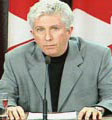 That at least would seem to be the optimistic point of view. The counterweights editors will in any event be watching and reporting on the proceedings in Ottawa with great interest over the week of November 1420.
That at least would seem to be the optimistic point of view. The counterweights editors will in any event be watching and reporting on the proceedings in Ottawa with great interest over the week of November 1420.
Over the subsequent week of November 2127 three of the principals must be out of the country on business. And it has been decided to shut down the office altogether, and pick up the story again on November 28 (ideally with something of the fresh perspective that travel, or just a week off, can sometimes induce).
Meanwhile, it may still be that the resolve of Jack Layton’s New Democrats to stick with their at least temporary new friends among the Conservatives and the Bloc Quebecois will start to wilt under the heat of the parliamentary fireworks over the next several days. As an exercise in political analysis, the great unknown at the moment is no doubt just how solid the new 170-seat opposition majority really is, on all three of its sides.
It may even still be possible for the wily neo-Machiavellian Liberals, with only 44% of the seats in the democratically elected parliament, and only 37% of the popular vote in the last June 2004 election, to magically pull everything out of the fire yet again – and finally have their election in April 2006. But it does not seem advisable to put real money down on this prospect right now.

